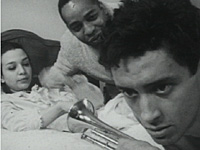Aspects of Film History: Cinematic Thinking - ARTS3062
Faculty: Faculty of Arts and Social Sciences
School: School of the Arts and Media
Course Outline: School of the Arts and Media
Campus: Sydney
Career: Undergraduate
Units of Credit: 6
EFTSL: 0.12500 (more info)
Indicative Contact Hours per Week: 5
Enrolment Requirements:
Prerequisite: 48 UOC overall, including 6 UOC at level 1 and 6 UOC at level 2 in one of the following streams, Film Studies; or ARTS1060, at least 6uoc in level 2 Film Studies electives and enrolment in a Media single or dual program
CSS Contribution Charge: 1 (more info)
Tuition Fee: See Tuition Fee Schedule
Further Information: See Class Timetable
View course information for previous years.
Description
Subject Area: Film Studies
The famous 20th Century philosopher Gilles Deleuze wrote in his books on cinema that ‘it is not sufficient to compare the great directors of cinema with painters, architects or even musicians. They must be compared to thinkers’. But what does it mean to think cinematically? In the wake of the decline of film theory as the unifying methodology of the discipline of film studies and the emergence of film-philosophy as one of several new approaches, this course identifies the question of the nature of film’s thought as a concern that dates back to the inception of cinema. Focusing on the kinds of ‘thinking’ undertaken by some of the ‘great directors’ in the history of cinema—including work by Eisenstein, Chaplin, Hitchcock, Dreyer, Welles, Rossellini, Sirk, Kubrick, Tarkovsky, Von Trier, and Malick—the course will introduce you to the diversity of contemporary approaches to the question of cinematic thinking (psychoanalytic, cognitivist, semiotic, philosophical) and to the work of the two most eminent philosophers of film: Stanley Cavell and Gilles Deleuze. A large part of the course will be devoted to reading key sections of Deleuze’s ambitious study Cinema 1: The Movement-Image and Cinema 2: The Time-Image and working through his major theses.









